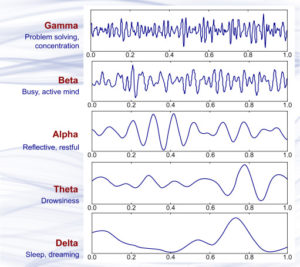BLOG
Hacking Brainwaves for Pace-Perfect Brain
Life, in general, can be demanding and stressful, and you may notice your mind and your schedule are greatly out of sync. You may find your mind feeling distracted while on a deadline or being frantically scattered while in a downward-facing dog pose. And you think to yourself, “It would be nice if I could have mind-control as my superpower. I would have full control over my unruly brain, adapting to whatever mental state I need, exactly when I need it!”
Sounds like science fiction?
Turns out mind control, or more correctly brainwave manipulation is not so far-fetched. Here’s how optimizing brainwaves to achieve a certain state of mind can enhance productivity, mental balance, and overall cognitive function.
what are brainwaves, anyway?
 Abhang, PA, Gawali, BW, Mehrotra, SC. Introduction to EEG- and Speech-Based Emotion Recognition, 2016.
Abhang, PA, Gawali, BW, Mehrotra, SC. Introduction to EEG- and Speech-Based Emotion Recognition, 2016.
https://doi.org/10.1016/B978-0-12-804490-2.00002-6
Brainwaves are electrical impulses fired when behaviors, emotions and thoughts are communicated between neurons within your brain. There are five types of brainwaves and depending on what you are doing at the time, brainwaves of different frequencies kick in.
The mental state associated with the five types of brainwaves runs the gamut from the slowest Delta brainwaves (1-3 Hz), which are what you experience when you are asleep, to the fastest Gamma brainwaves (39 – 42 Hz) that modulate perception and high-level information processing.
Abhang, PA, Gawali, BW, Mehrotra, SC. Introduction to EEG- and Speech-Based Emotion Recognition, 2016.
https://doi.org/10.1016/B978-0-12-804490-2.00002-6
What’s the big deal about brainwaves?
Controlling your brainwaves can help optimize productivity and relaxation.
In a study published in Neuron, MIT neuroscientists found that controlling alpha brainwaves improves concentration. Alpha waves (8-12 Hz) are believed to play a role in filtering out distracting sensory information. The study found when subjects learned to suppress alpha waves in one hemisphere of their parietal cortex, they were able to pay better attention to objects that appeared on the opposite side of their visual field.
In another MIT study, researchers found that beta waves control working memory. Because working memory has a limited capacity for storing information temporarily and beta rhythms act as the gatekeeper for what pieces of information are allowed to be read out from it, beta rhythms control what the brain is thinking about.
Healthy brain rhythms, in addition to coordinating critical cognitive functions such as learning and memory, perception and attention, can also decrease the risk for neurodegeneration.
How to manipulate brainwaves?
The five different types of brainwaves are present in your brain, and there is no such thing as a superior type of neural oscillation. The different brainwaves are all important and when in sync, can help you power through your daily tasks with efficiency. So how can you restore your brainwaves to a healthy cadence?
Besides the common health practices of meditation and yoga, there is also non-invasive brain stimulation by light.
Over the past two decades, brain photobiomodulation (PBM) therapy has been introduced as an innovative, safe way to stimulate neural activity to improve brain function. It enhances the metabolic capacity of neurons (more energy production) and stimulates anti-inflammatory and antioxidant responses. For healthy brains, it delivers a sufficient dose of brainpower booster to achieve optimal stimulation, fine-tuning brainwave activities to pace-perfection.
Here at Niraxx, our mission is to enable you to take charge of your brain health for life using our effective, easy-to-wear photobiomodulation (PBM) clothing solutions that optimize brainwaves performance. Discover our wearable difference.
References
Bagherzadeh, Y, Baldauf, D, Pantazis, D, Desimone, R. (2019). Alpha Synchrony and the Neurofeedback Control of Spatial Attention. Neuron, doi: 10.1016/j.neuron.2019.11.001.
Salehpour, F, Mahmoudi, J, Kamari, F, Sadigh-Eteghad, S, Rasta, SH, Hamblin, MR. (2018). Brain Photobiomodulation Therapy: A Narrative Review. Molecular Neurobiology; doi: 10.1007/s12035-17-0852-4.
Lundqvist, M, Herman, P, Warden, MR, Brincat, SL, Miller, EK. (2018). Gamma and beta bursts during working memory readout suggests roles in its volitional control. Nature Communications. doi: 10.1038/s41467-017-02791-8











